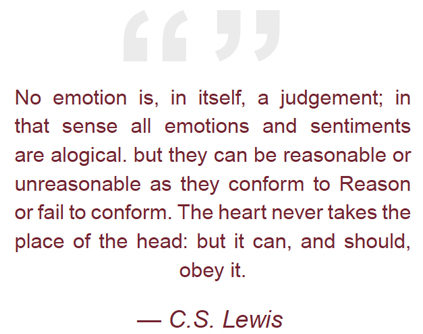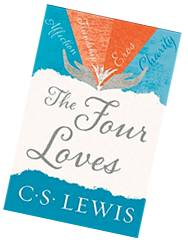Back to series
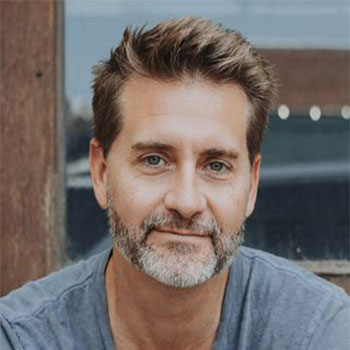

Recommended Reading:
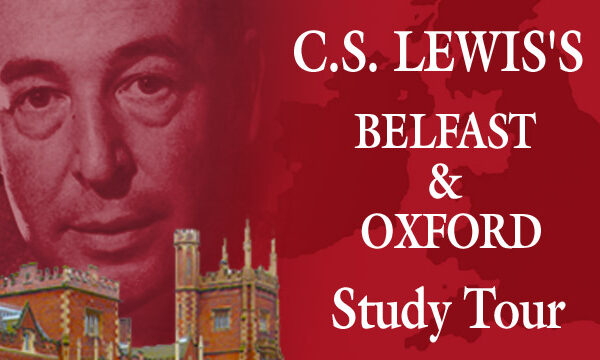
Download or Listen to Audio
Lewis on Emotion
Click here to open a Print - Friendly PDF
This past year for me has been about learning to live with heart. I won’t bore you with all the details; in short, I’ve always lived in and from my head. In childhood, I learned early that if I made my feelings known, they were met by one or another impaired response. Rage, self-pity, passive-aggressive barbs, various forms of shame-based motivation, these were the conditions in which my heart, mind, and soul were formed. So I learned how to survive, finding those ladders in life that might take me above the pain of emotional vulnerability. Academia proved to be the ladder that took me highest. It’s not the easiest climb, the scholarly life, but it’s predictable and especially tailored to the overly cerebral. It also turned out to be my route to C. S. Lewis.
From my first experience with Lewis — Mere Christianity, my senior year of college — I was hooked. That he offered something to my imagination and reason won’t surprise fellow Lewis devotees. That he helped me get my heart back certainly surprised me.
Reviving one’s heart is a complicated, messy process requiring many surgeons, and Lewis had a steady hand in it. In every Lewis book I read, I noticed a trope that seemed level with the rung on which I was trying, and failing, to balance life. How could it be? At every point, he seemed to know that I was trying to climb over my own humanity. Scene after scene in Lewis’s stories called me off the ladder and back onto the flat ground of life. And there I couldn’t rise higher or sink lower than anyone else. I couldn’t out-think or out-perform anyone. His stories wouldn’t let me. It was just me, my heart, and then this other Being whom Lewis kept putting in front of me. His name was Aslan, Lewis’s great Christlike lion. I couldn’t get around him. Perhaps I could stop climbing, but as a result of reading these books, before Lewis’s dangerous deity, I couldn’t stop confronting.
 Confrontation, I’d learn, is often how Lewis approaches the subject of human emotion. Lewis will get at the human heart by creating characters whose hearts need testing. I remember first noticing just how Lewis writes about emotion on my second trek through The Chronicles of Narnia. In The Silver Chair, the fourth Narnian chronicle, we are introduced to a character named Jill Pole. Unlike the Pevensie children and Eustace Scrubb, her forerunners into Narnia, Jill has never met Aslan. But upon a harrowing arrival, Jill is met straightaway by Aslan, who lay between her and a stream. Jill finds herself desperately thirsty — and terribly afraid.
Confrontation, I’d learn, is often how Lewis approaches the subject of human emotion. Lewis will get at the human heart by creating characters whose hearts need testing. I remember first noticing just how Lewis writes about emotion on my second trek through The Chronicles of Narnia. In The Silver Chair, the fourth Narnian chronicle, we are introduced to a character named Jill Pole. Unlike the Pevensie children and Eustace Scrubb, her forerunners into Narnia, Jill has never met Aslan. But upon a harrowing arrival, Jill is met straightaway by Aslan, who lay between her and a stream. Jill finds herself desperately thirsty — and terribly afraid.
“Are you not thirsty?” said the Lion.
“I’m dying of thirst,” said Jill.
“Then drink,” said the Lion.
Jill, not fond of this idea and certain the lion will kill her, asks Aslan to move. He does not. She gets agitated.
“Will you promise not to—do anything to me, if I do come?” said Jill.
“I make no promise,” said the Lion.
Jill was so thirsty now that, without noticing it, she had come a step nearer.
“Do you eat girls?” she said.
“I have swallowed up girls and boys, women and men, kings and emperors, cities and realms,” said the Lion. It didn't say this as if it were boasting, nor as if it were sorry, nor as if it were angry. It just said it.
“I daren't come and drink,” said Jill.
“Then you will die of thirst,” said the Lion.
“Oh dear!” said Jill, coming another step nearer. “I suppose I must go and look for another stream then.”
“There is no other stream,” said the Lion.1
I don’t now know if this exchange meant all that much to me, beyond its having the same charm and imaginative allure as almost any other scene from Lewis’s Narnian stories. But I know I couldn’t stop thinking about it, about Jill, her fear, and the great Lion.
This is actually a familiar moment in Lewis’s fiction. The particulars change from story to story, but the convention stays the same. A character is presented with a hard choice. That choice frequently involves the prosaic—in Jill’s case the choice to drink from a stream or not—but there is always something more profound at stake. Jill doesn’t know it yet, but before her, in Aslan, sits deity incarnate. And the “thirst” Aslan speaks of here is metaphysical, only satiated, little known to Jill, by the very Being who lies between her desire and its object. Lewis describes Jill’s reluctant decision to kneel and drink as the “worst thing she had ever had to do.” The water, a metaphor for the kind of spiritual life she’ll come to know in Aslan, was the “coldest, most refreshing” she’d ever tasted. Her fear has given way to delight. As characters in Lewis’s stories go, Jill, at the crossroads of decision, is in good company. It’s the same place her Narnian predecessors, the Pevensies, found themselves at first hearing the name of Aslan, when
each one of the children felt something jump in his inside. Edmund felt a sensation of mysterious horror. Peter felt suddenly brave and adventurous. Susan felt as if some delicious smell or some delightful strain of music had just floated by her. And Lucy got the feeling you have when you wake up in the morning and realize that it is the beginning of the holidays or the beginning of summer.2
It’s the same somewhat terrifying place Eustace Scrubb, Jill’s companion, had found himself on an earlier visit to Narnia. Once he mustered the courage to let Aslan tear away his dragonish hide, Eustace became a different boy. Lewis takes his characters — takes us — to the emotional brink where life transformation borders vulnerability.
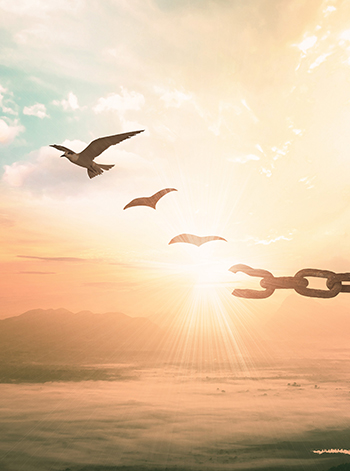 Jill, like the Pevensies, like Eustace, won’t slake her thirst by denying her feelings but rather by living through the truth of them. She can’t move away from her fear; she must push into it. Emotions in Lewis’s stories are the means by which characters experience the divine — whether going through the fear of facing the lion poised between thirst and soul quenching waters or enduring the hurt necessary to become a different boy. To Lewis, feelings are nothing less than the human heart’s response to God.
Jill, like the Pevensies, like Eustace, won’t slake her thirst by denying her feelings but rather by living through the truth of them. She can’t move away from her fear; she must push into it. Emotions in Lewis’s stories are the means by which characters experience the divine — whether going through the fear of facing the lion poised between thirst and soul quenching waters or enduring the hurt necessary to become a different boy. To Lewis, feelings are nothing less than the human heart’s response to God.
Lewis is quick to remind us not to give our feelings too much power. “Feelings come and go,” he writes, “and when they come a good use can be made of them: they cannot be our regular diet.”3 Our diet also consists of reason, our wills, and our imagination, to be sure, and Lewis tells stories that offer us the full course.
But readers often miss just how important emotions are to Lewis. I see two reasons for this: (1) the unmistakable theological element in his work and (2) his reliance on apologetic argument. Much of Lewis’s fiction is colored with theological themes. Consider, for example, the person and sacrifice of Aslan in The Lion, the Witch and the Wardrobe. It’s difficult to see the book’s message in terms outside a theological framework, which is obvious and hard to ignore. And the kind of theology we find is often apologetic. Lewis will use a scene of dialogue to stage an almost airtight display of logic. Works like The Pilgrim’s Regress and The Great Divorce teem with philosophical diatribes in defense of one aspect of Christian truth or another. But we must not lose the place of the heart in all of Lewis’s appeals to the mind. If we do, we lose the whole of Lewis’s vision for what it means to experience God.
One treasure of reading Lewis, perhaps the one that has become the most valuable to my Christian life, is noting to what good use his characters put their emotions. The choices that Lewis continually sets before his fictional cast offer opportunities for the heart’s right response. We, as readers in a vicarious relationship with these characters, are meant to find ourselves in the crux of their choice. Their decisions are ours. Will we marshal our hearts toward the true object of its affections, or will we enclose in the self-protection of lesser loves?
Lewis’s The Great Divorce is almost entirely built on this question. Characters find themselves in conversations that prove to be eternal crossroads. Each is asked to make a full-hearted response to a divine invitation; all must dare to love something greater than themselves. Here’s just one example that lets us in on how Lewis feels about feelings. We come across a mother named Pam, whose selfish love for her son Michael has turned her heart back in on itself. A Bright Spirit, Pam’s brother as it turns out, encounters Pam in the high green outskirts of heaven, where he, as a mouthpiece for Lewis’s own views on emotion, calls out his sister’s poor understanding of love:
He wanted you to love Michael as He understands love. You cannot love a fellow-creature fully till you love God. Sometimes this conversion can be done while the instinctive love is still gratified. But there was, it seems, no chance of that in your case.
4Lewis offers up a high view of the power of emotion. Only the heart that has known divine love can give human love. This is human emotion put to good use. Instinctive love, love partly given for the lover’s own benefit, proves to be emotional impairment if unaccompanied by divine love. In Pam’s case, her love for her son was so entrenched in self-serving love that no amount of instinctual affection would redeem it. When Pam rejects the idea that instinctive love is somehow a lesser love, she does so out of confusion about the nature of emotions. She confuses that she has emotions with their purpose — “This is all nonsense — cruel and wicked nonsense. What right have you to say things like that about Mother-love? It is the highest and holiest feeling in human nature.”
5 The presence of emotions doesn’t have ultimate say over their own purpose. Pam hasn’t arrived yet; what she feels can’t be the only guide in how she ought to feel. Pam falls into the kind of impaired love Lewis warns against in his introduction to The Four Loves. Quoting Denis de Rougemont, Lewis says, “love ceases to be a demon only when he ceases to be a god.”
6Lewis warns that every kind of love—be it erotic, patriotic, familial — has the potential to compete with our love for God. Human love, Lewis says, at its height, has a tendency to claim for itself a divine authority. It isn’t that any love is in itself a threat to love for God. The problem lies in the lover’s disproportionate affections.

Surrendered to God, emotions are poised to proportionate expressions. A lover best loves his or her spouse, a patriot his or her country, a mother her son, when they first and most love God. As the Bright Spirit tells Pam, “No natural feelings are high or low, holy or unholy, in themselves. They are all holy when God’s hand is on the rein. They all go bad when they set up on their own and make themselves into false gods.”
7 Love, fear, sadness, loneliness, anger, shame, guilt, gladness, and the like don’t exist for their own benefit. God didn’t create us as emotional beings just so that our emotions would bring us back around to ourselves.
This impaired state that Pam can’t seem to move beyond isn’t due to having emotions, or even feeling the wrong emotions, but rather because her emotions aren’t properly scaled. For Lewis, emotions aren’t to be avoided. They’re to be felt but felt fully in relationship with the rest of what comprises the human condition. This idea permeates Lewis’s work on emotions. In the Abolition of Man, he writes,
No emotion is, in itself, a judgement; in that sense all emotions and sentiments are alogical, but they can be reasonable or unreasonable as they conform to Reason or fail to conform. The heart never takes the place of the head: but it can, and should, obey it. 8
The Christian’s life isn’t emotionless; it’s appropriately emotional. Feelings aren’t to be downplayed or overblown, but rather right sized. They are reliable governors only when they themselves are governed. But once right sized, once governed, they can become the means of approaching the One who created us to have them.
I began by saying that the choice Lewis is so fond of putting before his characters is our choice. And that choice takes place in the heart, that is, through the emotions. But where I began is as important as how I began: Jill fearful before the Lion. Every emotion felt before God hovers around a dangerous vulnerability. Jill’s fear. The Pevensies’ emotional array. Eustace’s hurt. Pam’s selfish loneliness for her lost son. Each emotion occasions risk. Each character can choose to step into the pain of what they feel, trusting God before them to sift through what should be honored and what should be lost. To feel, as we most certainly will, is to move closer to the cool waters—and to the crouched lion. To feel is to dare pain. But God calls the human heart to be in pain for something greater than pain itself.
In one of Lewis’s most famous quotations from The Four Loves, he says:
To love at all is to be vulnerable. Love anything, and your heart will certainly be wrung and possibly be broken. If you want to make sure of keeping it intact, you must give it to no one, not even an animal. Wrap it carefully round with hobbies and little luxuries; avoid all entanglements; lock it up safe in the casket or coffin of your selfishness. But in that casket—safe, dark, motionless, airless — it will change. It will not be broken; it will become unbreakable, impenetrable, irredeemable. 9
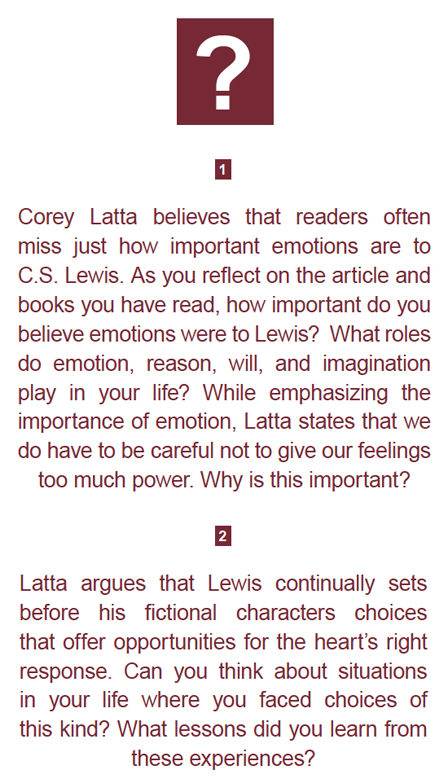 The risk we run in living with heart is that our hearts will be broken. Yet we’re told that nothing that isn’t first broken can be made whole. Christians must feel their feelings and give their hearts away in the great promise that “unless a kernel of wheat falls to the ground and dies, it remains only a single seed. But if it dies, it produces many seeds” (John 12:24 NIV). The lion will surely swallow us. At times, our hearts will host Edmund’s horror and Peter’s passion. Aslan’s great paws will certainly hurt; dragon skin is hard to tear off. And I’m quite certain I’ll always feel the temptation to go the impaired way of Pam. But unless I want what was made for redemption to calcify into something irredeemable, then I’ll risk the vulnerability. Unless we want what’s made for abundant life emptied of its capacity to hold the life it’s created for, then we’ll approach the stream. If we want to drink, we’re going to have to feel our fear. If we want to live full-hearted lives, we’re going to have to face the lion.
The risk we run in living with heart is that our hearts will be broken. Yet we’re told that nothing that isn’t first broken can be made whole. Christians must feel their feelings and give their hearts away in the great promise that “unless a kernel of wheat falls to the ground and dies, it remains only a single seed. But if it dies, it produces many seeds” (John 12:24 NIV). The lion will surely swallow us. At times, our hearts will host Edmund’s horror and Peter’s passion. Aslan’s great paws will certainly hurt; dragon skin is hard to tear off. And I’m quite certain I’ll always feel the temptation to go the impaired way of Pam. But unless I want what was made for redemption to calcify into something irredeemable, then I’ll risk the vulnerability. Unless we want what’s made for abundant life emptied of its capacity to hold the life it’s created for, then we’ll approach the stream. If we want to drink, we’re going to have to feel our fear. If we want to live full-hearted lives, we’re going to have to face the lion.
|
Notes: |

Corey Latta
AuthorCorey Latta is a writer, teacher, and public speaker. He holds MAs in Religion and English and earned his PhD in twentieth-century Literature from the University of Southern Mississippi. He is the author of several books including C.S. Lewis and the Art of Writing, Election and Unity in Paul’s Epistle to the Romans, Functioning Fantasies: Ideology, Theology, and Social Conception in the Fantasies of C. S. Lewis and J. R. R. Tolkien, When the Eternal Can Be Met, and C.S. Lewis and the Art of Writing. Corey has written articles and given talks on subjects ranging from C. S. Lewis, the theology of creativity, the neurology of the imagination, and the power of story to heal life’s wounds.

Recommended Reading:
C.S. Lewis, The Four Loves (HarperOne, Reissue edition, 2017)
C.S. Lewis — the great British writer, scholar, lay theologian, broadcaster, Christian apologist, and bestselling author of Mere Christianity, The Screwtape Letters, The Great Divorce, The Chronicles of Narnia, and many other beloved classics — contemplates the essence of love and how it works in our daily lives in one of his most famous works of nonfiction. Lewis examines four varieties of human love: affection, the most basic form; friendship, the rarest and perhaps most insightful; Eros, passionate love; charity, the greatest and least selfish. Throughout this compassionate and reasoned study, he encourages readers to open themselves to all forms of love — the key to understanding that brings us closer to God.
 COPYRIGHT: This publication is published by C.S. Lewis Institute; 8001 Braddock Road, Suite 301; Springfield, VA 22151. Portions of the publication may be reproduced for noncommercial, local church or ministry use without prior permission. Electronic copies of the PDF files may be duplicated and transmitted via e-mail for personal and church use. Articles may not be modified without prior written permission of the Institute. For questions, contact the Institute: 703.914.5602 or email us.
COPYRIGHT: This publication is published by C.S. Lewis Institute; 8001 Braddock Road, Suite 301; Springfield, VA 22151. Portions of the publication may be reproduced for noncommercial, local church or ministry use without prior permission. Electronic copies of the PDF files may be duplicated and transmitted via e-mail for personal and church use. Articles may not be modified without prior written permission of the Institute. For questions, contact the Institute: 703.914.5602 or email us.
-
Recent Podcasts
The Side B Stories – Dr. James Tour’s story
by Jana Harmon, James Tour on April 12, 2024From a secular Jewish home, scientific scholar and...Read More
-
Why are Christians so Bad?
by Paul Joen on April 5, 2024
-
Questions That Matter Podcast – Dai Hankey and Gospel Hope for Weary Souls
by Randy Newman, Dai Hankey on April 5, 2024
-
Recent Publications
Isn’t Morality Relative?
by Christopher L. Reese on April 1, 2024It is widely accepted in the Western world...Read More
-
Do Muslims and Christians Worship the Same God?
by Andy Bannister on March 1, 2024
-
Artificial Intelligence and Its Impacts on Humanity
by John Lennox on February 13, 2024
0
All Booked
0.00
All Booked
0.00
All Booked
20599
GLOBAL EVENT: 2024 Study Tour of C.S. Lewis’s Belfast & Oxford
https://www.cslewisinstitute.org/?event=global-event-2023-study-tour-of-c-s-lewis-belfast-oxford-2&event_date=2024-06-22®=1
https://www.paypal.com/cgi-bin/webscr
2024-06-22

Next coming event
Days
Hours
Minutes
Seconds
GLOBAL EVENT: 2024 Study Tour of C.S. Lewis’s Belfast & Oxford
On June 22, 2024 at 12:00 pmat Belfast, Northern Ireland & Oxford, EnglandSpeakers

Corey Latta
Author
Team Members

Corey Latta
AuthorCorey Latta is a writer, teacher, and public speaker. He holds MAs in Religion and English and earned his PhD in twentieth-century Literature from the University of Southern Mississippi. He is the author of several books including C.S. Lewis and the Art of Writing, Election and Unity in Paul’s Epistle to the Romans, Functioning Fantasies: Ideology, Theology, and Social Conception in the Fantasies of C. S. Lewis and J. R. R. Tolkien, When the Eternal Can Be Met, and C.S. Lewis and the Art of Writing. Corey has written articles and given talks on subjects ranging from C. S. Lewis, the theology of creativity, the neurology of the imagination, and the power of story to heal life’s wounds.



